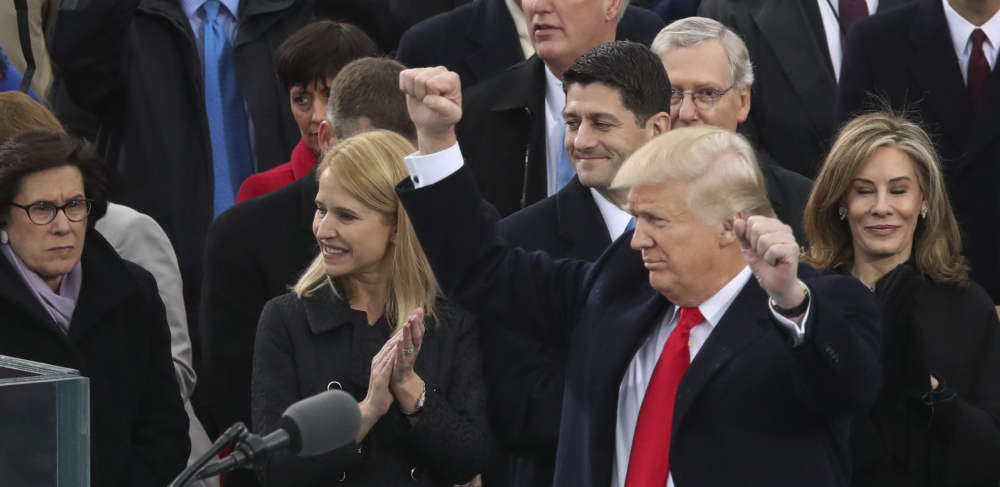Donald Trump began his presidency with blunt, searing talk about a crippled nation in dire need of bold, immediate action. Breaking with more than two centuries of inaugural-address history, the new president made clear, in case anyone had not yet gotten it, that his will be a very different presidency.
Trump spurned the poetry and grandeur of most inaugural speeches and instead delivered a rallying cry, reminiscent of his stream-of-consciousness campaign talks, brimming with brash bravado about his intention to bring massive change: “This American carnage stops right here and stops right now.”
“This was pure Trump, just a declaration of war against the Washington establishment and President Barack Obama,” said Craig Shirley, author of books on Ronald Reagan and a Republican political consultant. “It was not the usual call for togetherness; it was Trumpism, the speech of a businessman – problems and solutions, very utilitarian.”
Trump had promised for nearly a year that when the time came, he would pivot to a style he called “presidential.” But his speech made plain that he intends to govern as he campaigned, in direct communion with his followers, bypassing the usual niceties and channels of power.
After a quick nod to his predecessors, Trump launched into a fiery recitation of the ills of a country that he has long described in apocalyptic terms – a hollowed nation that he intends to restore to greatness by “giving it back to you, the American people.”
Seconds after taking the oath of office, Trump tore into the people who have run the country.
“For too long, a small group in our nation’s capital has reaped the rewards of government while the people have borne the cost,” he said. “Politicians prospered – but the jobs left, and the factories closed. The establishment protected itself, but not the citizens of our country.”
“This was a campaign speech,” said Elvin Lim, a political scientist at the National University of Singapore who has written extensively on inaugural addresses. “This is a big break from the inaugural tradition: Where others have emphasized continuity, he stressed that this is a sharp break with everything that has come before.”
The president’s chief strategist, Stephen Bannon, the nationalist polemicist who had a hand in crafting Trump’s speech, called the address “an unvarnished declaration of the basic principles of his populist and kind of nationalist movement.”
Bannon compared the speech to the populist appeal of the 19th-century president who famously invited the unwashed masses into the White House: “I don’t think we’ve had a speech like that since Andrew Jackson came to the White House. But you could see it was very Jacksonian. It’s got a deep, deep root of patriotism there.”
Whether Trumpism comes to be defined as a vibrant patriotism or a virulent nationalism will play out over the coming years, but the first president to be elected without government or military experience put down his marker as a man who will govern by the strength of his personality and the power of his blunt, sometimes lurid language.
Never before had an American president used words such as “carnage,” “depletion,” “disrepair” and “sad” to describe his own country in an inaugural address.
Send questions/comments to the editors.



Success. Please wait for the page to reload. If the page does not reload within 5 seconds, please refresh the page.
Enter your email and password to access comments.
Hi, to comment on stories you must . This profile is in addition to your subscription and website login.
Already have a commenting profile? .
Invalid username/password.
Please check your email to confirm and complete your registration.
Only subscribers are eligible to post comments. Please subscribe or login first for digital access. Here’s why.
Use the form below to reset your password. When you've submitted your account email, we will send an email with a reset code.